On April 2, 2023, the release by the Disney production company of the new version of the film "Peter Pan and Wendy" is expected, where Wendy, until now Peter Pan's companion, appears on an equal footing in the title.
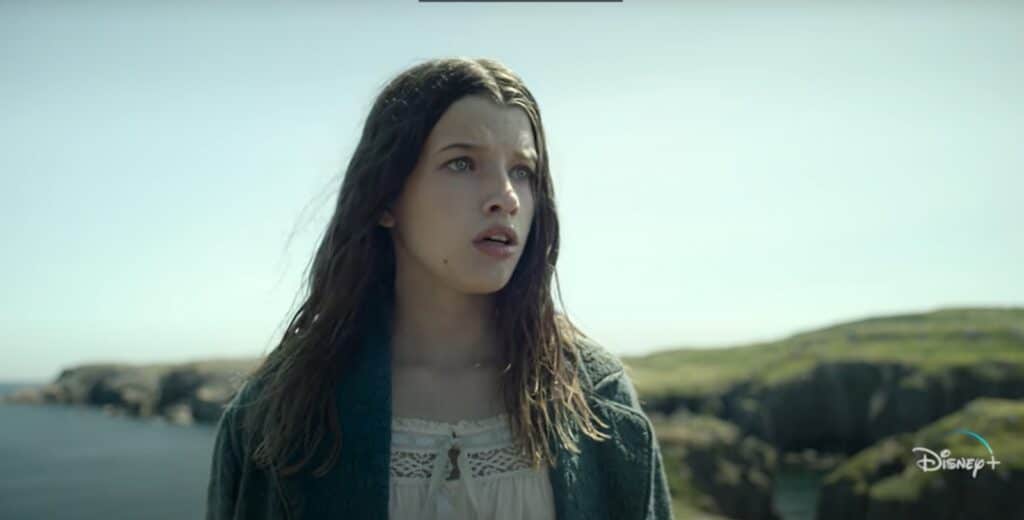
The last stage of publicity began with a trailer for the film. At the beginning of the short, also located in Edwardian England, Wendy appears upon her arrival in Neverland ?Neverland?. Also appears tinkerbell ?Tinkerbell? played by African-American actress Yari Shahidi. Also, it seems that Wendy is the central character of the story, which is reinforced by her mention in the title. The rest of the story doesn't seem like much of a departure from the 1953 animated film.
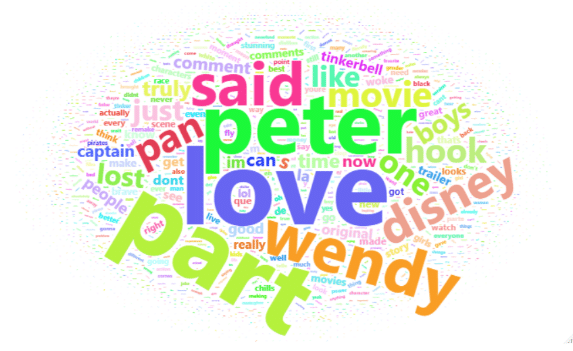
On social networks, some users expressed their disenchantment with the new version.
In this way, many users, as the frequency cloud shows us, satirically expressed that they liked the trailer precisely what did not appear in it, under the figure of "I just loved the part?".
One Reddit user says, "Fuck this trailer, fuck this movie, fuck the writers, and fuck Disney," then clarifies that he's upset that Wendy's role in the film has been altered. It begins by saying, "??? there should be no missing girls. That's not me being sexist, Peter Pan himself says so in the books "Oh no, girls, since they're too smart to fall out of their prams?", then continues, "Secondly, why are they trying to make Wendy one of those “modern boss girls”? She is the mother of the group who watches over the children and inevitably convinces them to come home and grow up."
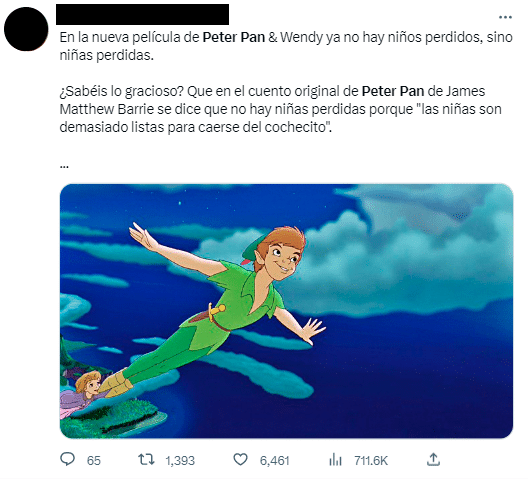
Finally, he concluded “I have been a fan of Peter Pan for as long as I can remember. I was obsessed with it as a kid and to me it is a classic that is sacred. This trailer feels like the writers just took the heart out of my inner child, spit it out, and then stomped on it."
A user on YouTube states that Tinkerbell "Tinkerbell", since the fifties version, has always been white. By way of proof, he affirms that in all the toys and cartoons where he has appeared, he has always been white.
Some users go further. For example, on Twitter a user accuses that in Hollywood there is an agenda to represent white people as bad. On the other hand, we also find expressions from users on the networks expressing their enthusiasm for the premiere of the film.
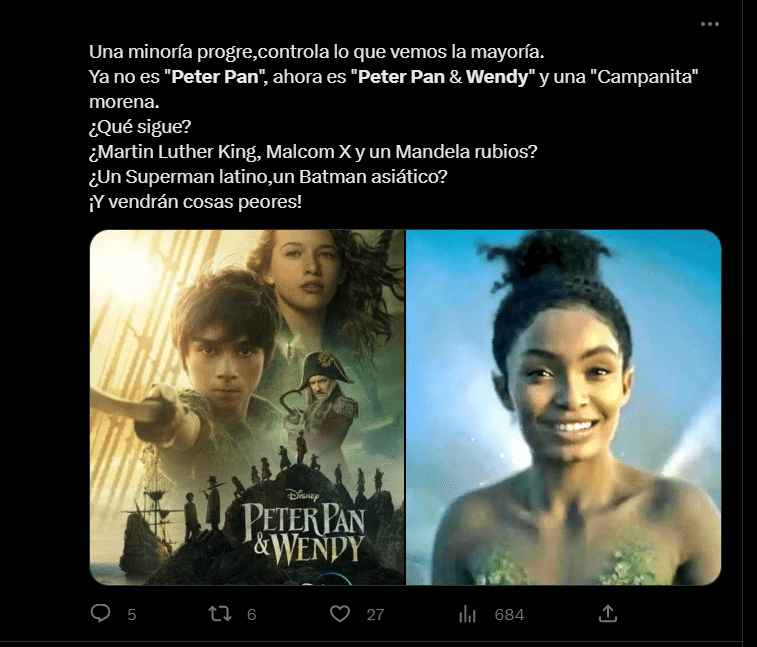
Why the controversy? Isn't it just a version of a fiction? In order to make sense of it, it is convenient to remember the historical panorama in which the first version of Peter Pan was produced? 1953?. This was an America before civil rights.
In the children's film without any modesty, the original North American peoples are represented as "red skin" ?red skin?, a situation that is emphasized during a dance in the children's film where they are drawn as a wild people, while in media terms the consolidation continued of the American media system.
This was the first year that the Oscars were broadcast on television. On television you could see the series "The Lone Ranger"? The Lonely Ranger?. A brave masked vigilante accompanied by Toro ?Tonto?, the latter represented a member of the Native American peoples although he did so by portraying him as ?backward? or wild.
In social terms, while Peter Pan was successfully released as Disney's fourteenth feature film, strict segregation laws still existed in North America. While women were trapped in "traditional roles," African-Americans had few job opportunities and suffered severe discrimination. An even more serious situation in the southern states.
Disney would return to the Edwardian England of Peter Pan ten years later when recording the movie Mary Poppins ?1965?. Unlike Peter Pan, which was only considered a children's film, Mary Poppins ?1965?, whose central protagonist is a woman, was Disney's first feature film with wide critical acclaim, receiving several Oscar nominations and winning in five categories. .
In social terms, a decade later, the fight for civil rights had also made important advances. A year earlier, in 1964 the Civil Rights Act was approved and in 1965 the Voting Rights Act would be approved, both legal documents benefited both women and the African-American population, since they promoted equality within North American society. regardless of gender, race or religion.
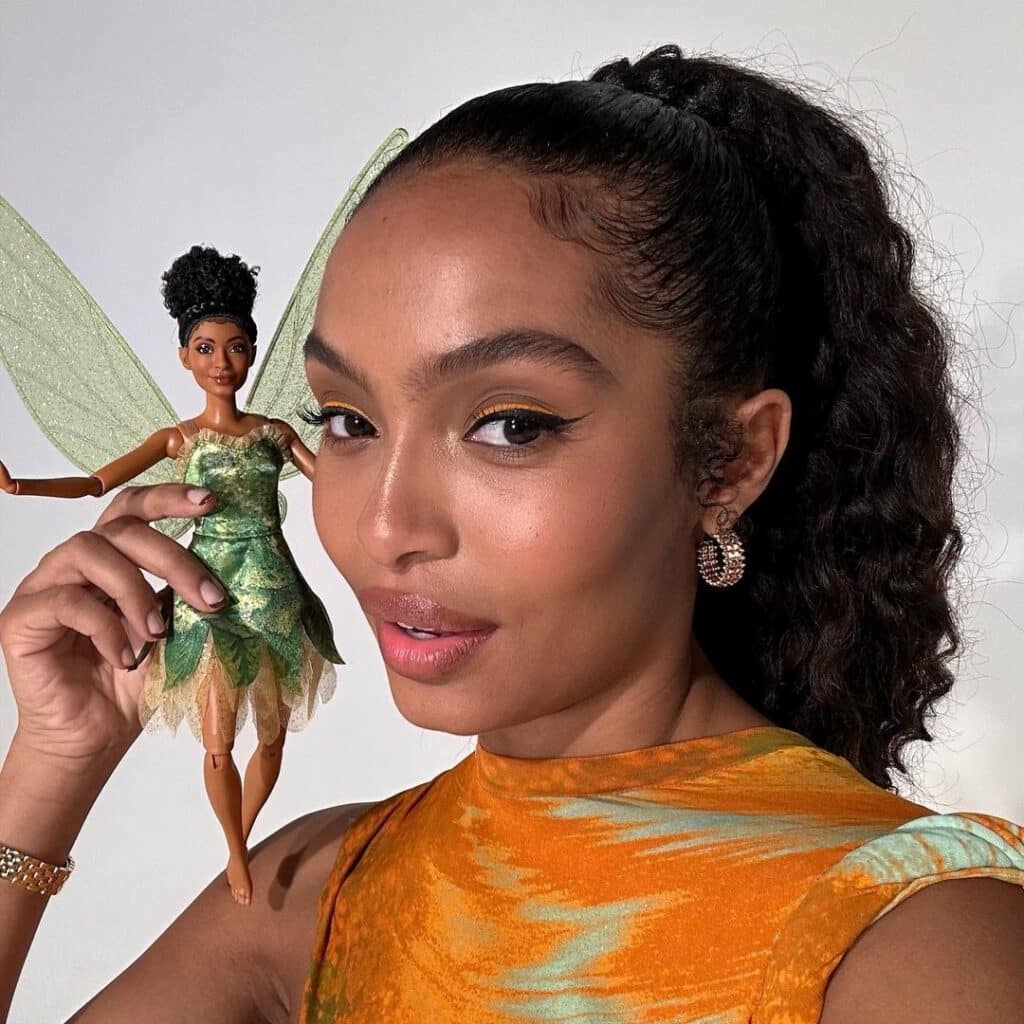
However, the fight for inequality is not over. The USC Annenberg Inclusion Initiative has pointed out that the representation of non-white characters or women in leading roles is unusual in both television series and movies. A situation that worsens if we consider that these North American productions ?dominant entertainment industry globally? they are seen outside the countries of the north, where these stereotypes contribute to perpetuating a colonialism that is still in force.
In recent years there have been different initiatives to reduce negative representations of non-white people, women or outside of traditional practices in North American film and television programs.
In this context, Peter and Wendy ?2023? are part of a series of reinterpretations of classic Disney stories. Where the company ?buoyed by the increase in both purchasing power and the percentage of the non-white population in the United States, as well as the possibility of generating profits around the world? seeks to achieve products that reflect these multicultural societies.
The Reddit user angrily exposes the risk that the new version of Disney represents for his childhood, although in reality he shows his disagreement with the change in roles that society has experienced over the last decades.
Another user claims that an African-American actress does not remain in fixed roles reproducing the separation of races due to their social roles, an anger that allows us to observe her anger at the loss of privileges. Isn't your claim based on changes in the role of the female character? Isn't it anger over the fall of barriers to social roles based on ethnicity or gender? Postures that seek to eternalize Wendy as an eternal companion and never the protagonist of the story. While only white women can represent Tinkerbell?tinkerbell?.
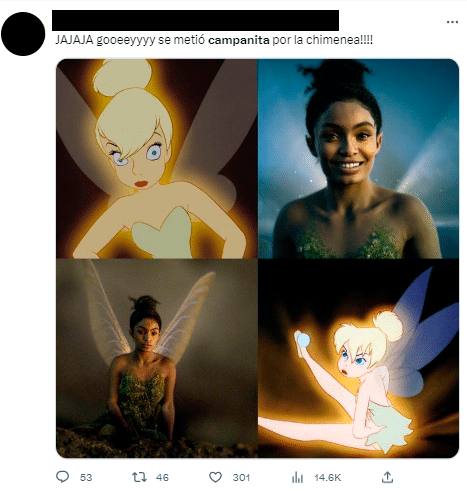
Perhaps in the same Disney movies we can find the answer. In Snow White and the Seven Dwarfs "Snow White and the Seven Dwarfs, 1937", another Disney animated film, Queen Grimhilde, angry at the response of her magic mirror, orders Snow White to be sacrificed. However, his command is disobeyed. Then, the queen herself, full of rage, disguises herself as an old woman and tricks Snow White by offering her a poisoned apple. At the end of the film, the protagonist is revived. Grimhilde's efforts, anger and rage were useless. History was underway and there was no way she would be able to recover her lost beauty.


This publication was supported in whole or part by funding provided by the State of California, administered by the California State Library.

You may be interested in: The Little Mermaid




